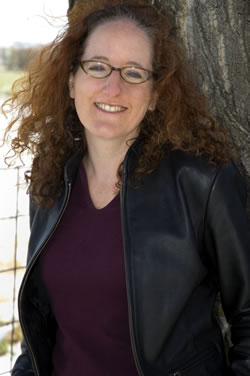|
Research. How important is it? I did a lot of research for my forthcoming novel, an optimistic, dystopic fantasy in which medieval characters reach through the centuries to change history, and characters from some future time—a Pythagorean pizza-chain employee and a warrior-librarian—visit centuries past. I was free to imagine future times, of course, but I wanted the past to be recognizable: I wanted it to be "real," a believable universe in which my unbelievable characters could conduct their unbelievable quest. I wanted readers to picture the jail in which Marco Polo dictated his Travels. I wanted them to see, smell, and hear the streets of thirteenth-century Rome, so that when Leonard runs from the Inquisition in his "crayon-colored sleeping togs" and Sally heroically pulls out her "personal collapsible beacon" (beta version) designed based on the optics of medieval scientist Roger Bacon, the unbelievable might seem, well, believable. I filled my shelves with books—obscure tomes of history, mysticism, medieval number theory, and Roman architecture. I talked with experts, I had a friend fact-check my manuscript, I wrote a three-page cheat sheet for my editor about historical sources. I stared at medieval maps and lithographs of old Rome and floor plans and architectural descriptions and reconstructions. I like to think that the book's details—the scrips, the eel, the garbage dumps, and weird medieval travelers' tales—help create this believable universe.
But research offered more than just a convincing backdrop. It offered examples of the strangeness of history, unexpected facts that offered hooks on which I could write my strange tale (because truth really can be more strange than fiction!). I learned that Polo's prison was on the water in Genoa, for example—and wasn't that poignant, given that he'd spent much of his wandering life at sea! Now he could look out the window and sigh because he fancied he'd seen his Uncle Maffeo sailing by on a boat. I learned that grain was once ground in floating mills on the Tiber and butchers once sold meat in the arcades of the Theater of Marcellus (maybe). Now my warrior-librarian could be surprised by a flour-covered "grain smasher," whom she imagines to be a ghost! Now "carcass sellers" could be befuddled witnesses to the wraithlike comings-and-goings of the mystic Abulafia!
I couldn't be fully accurate, of course. I wasn't able to learn whether there were windows in Polo's cell which might allow that poignant view of the water. I couldn't learn what the inside of the Theater of Marcellus was like, or what Roman inquisitors wore on their feet, or, or, or. But I didn't need to be fully accurate! I'm a fiction writer, not an historian. It's my job to make thing up! If I decided there were narrow corridors inside the Theater of Marcellus, and, uh, some stairs and a room or two, and maybe it was dank, by gum, I could make it so! If I wanted my inquisitor to wear boots, because boots are loud, and angry, and menacing, boots it would be.
Emboldened, I sometimes ignored fact. When a rabbi-professor friend reminded me, gently, that Abulafia, being Sephardic, would never have said, Feh, or used Yiddish words like treyf, I decided that my Abraham Abulafia, who after all shared many characteristics with the "real" Abraham Abulafia, could say such things because, well, it was funny. Research would serve my book, and this was a book, after all—a romp, where fast-food chains proselytized for Whigs and Dadaists, and alephs quivered and revealed mysteries, and mystics appeared on a wall, waving their hands in cartoon form, hoping to impart important secrets. Research for accuracy, research for strangeness, research that could be discarded when inconvenient—all useful for creating a believable and entertaining universe.
|


